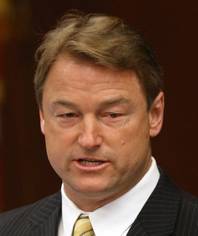Thursday, Aug. 18, 2011 | 2:48 a.m.

Dean Heller
Sun coverage
Sen. Dean Heller’s call to increase transparency on the debt ceiling super committee has gained its first outside endorsement. And the source of it just goes to show that even where the parties agree, partisanship seems destined to reign.
The National Taxpayers’ Union came out this week in support of Heller’s call to televise, advertise and open all proceedings of the 12-member committee of lawmakers created to slash $1.5 trillion from the deficit by Thanksgiving.
While the NTU is officially a non-partisan organization, it’s a staunch advocate for adopting a national flat tax and a balanced budget amendment. Those initiatives are favorites of the GOP but don’t gain much traction among Democrats, who argue that they are unfairly burdensome to the poor and destructive to job creation.
But that’s not to say Democrats disagree with Heller’s argument about the super committee process.
House Democratic Leader Nancy Pelosi has been clamoring for almost as long as Heller for committee deliberations to be “open to the press, to the public, and webcast.”
“Any acceptance of the committee proposal will be dependent on the ability of the American people to fully view its proceedings,” Pelosi said in a statement released Aug. 5.
Heller’s paper trail is a bit longer.
Late last week, he and Florida Rep. Vern Buchanan, also a Republican, sent independent letters to each of the dozen members of the super committee stating their request and filed legislation to mandate the same.
“Your committee essentially has the ability to craft a list of recommendations without any public input,” Heller and Buchanan wrote in the letter to Sen. Patty Murray, the Washington Democrat Sen. Harry Reid appointed to serve as one of the committee co-chairs and the only woman on the committee.
“All Americans should have the ability to see how the committee crafts a concrete plan for our fiscal future,” the letter continued.
Heller did not vote for the final compromise package of cuts to raise the debt ceiling, though he did tell reporters following passage that he was happy the debt limit was raised.
There’s no legal requirement that the proceedings of the committee — actually, Senate Majority Leader Harry Reid’s brainchild — be played out in public or broadcast live.
A public process isn’t a novel idea.
Health care negotiations started off televised on C-SPAN but that quickly devolved into political posturing. Eventually, the process retreated to traditional committee and conference rooms.
The Wall Street reform megabill known as Dodd-Frank fared better in public. The conference committee that reconciled the House and Senate bills did all of its work under camera lights.
The super committee has even more power than either of those ad hoc groups because its product — presuming there is one — goes straight to a no-filibusters-allowed vote.
Removing such common procedural roadblocks potentially changes each party’s stake in compromise.
If Senate Democrats don’t need to win over seven Republicans to meet a 60-vote, filibuster-busting threshold, there’s less pressure for them to move to the right, as they largely did during debt ceiling negotiations.
But that also gives Republicans less reason to compromise, because moving further left guarantees a split in the GOP. The rightmost branch of House Republicans have already shown they are willing to break from their leaders’ own deficit reduction plans when they’re seen as imperfect.
A failure to compromise, however, doesn’t trigger an automatic doomsday. President Barack Obama has a backup, fail-safe way to raise the debt ceiling through early 2013 over Congress’ objection.
If the committee fails to come up with something and automatic “sequestration” cuts kick in, lawmakers — especially Democrats — could still spin things as a victory: Medicaid, food stamps, Social Security and veterans’ benefits won’t get touched.
Ultimately, how far the process gets depends on how deeply politics permeates the committee, which is exactly what those calling for transparency want to see.
The proximity of most committee members to the top of their parties — and the absence of go-it-alone types like the Gang of Six members, who actually came up with a bipartisan, balanced budget reduction proposal in advance of the debt ceiling deadline — suggests where party leaders can pull behind-the-curtain strings, they will.
The Democrats are all but exclusively composed of party leadership. In the House, Maryland’s Chris Van Hollen, South Carolina’s Jim Clyburn, and California’s Xavier Becerra, are part of Pelosi’s innermost circle. In the Senate, co-chair Murray is the caucus’s chief Election 2012 strategist, while Montana’s Max Baucus leads the Senate Finance Committee, where tax laws are written. Sen. John Kerry rounds out the Dems.
Republicans also include two House committee chairs: Ways and Means’ Dave Camp and Energy and Commerce’s Fred Upton. Fourth-from-the-top Republican Rep. Jeb Hensarling of Texas, Senate GOP Whip Jon Kyl, Pennsylvania Sen. Pat Toomey, noted for his Tea Party credentials, and Sen. Rob Portman of Ohio, a budget advisor to President Ronald Reagan, complete the Republican roster.

Join the Discussion:
Check this out for a full explanation of our conversion to the LiveFyre commenting system and instructions on how to sign up for an account.
Full comments policy